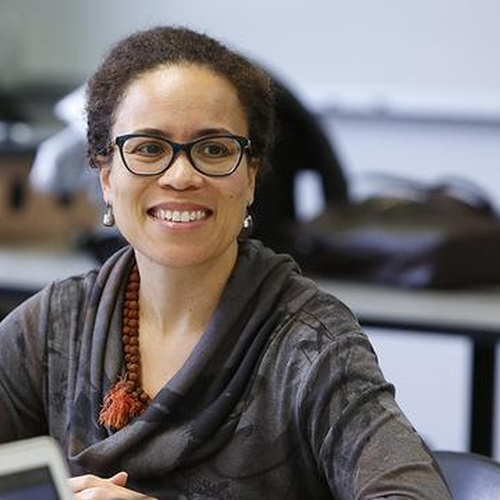This fall, Professor Catherine Squires joined the Humphrey School of Public Affairs as its new associate dean. A professor of communications studies in the College of Liberal Arts since 2007, Squires is currently a member of the IAS Advisory Board and is an alum of the IAS Residential Faculty Fellows program.
Squires’s work has often been interdisciplinary, community engaged, and focused on race, gender, politics, and civic media and history.
Since 2008, she and various project partners have collaborated with Robin Hickman-Winfield at Gordon Parks High School (GPHS) in Saint Paul to develop curriculum and media arts programs that provide students with community connections and media training that link them to local colleges, resources, and social justice causes. For the past seven years, she has also been collaborating with staff, youth, and local leaders to build the Hallie Q. Brown (HQB) Center Community Archive, a collection of community memories, which now contains more than 2,000 artifacts of the Black experience in Minnesota dating from the mid-nineteenth century forward.
During her time as an IAS Residential Faculty Fellow in the Spring of 2018, her work focused on coding and analyzing the multifaceted data she had gathered during her time to date at GPHS and documenting the ways community educators infused the school’s curriculum with the story of Gordon Parks, his struggles and accomplishments, and media-enriched civic learning.
Since that time, her work with GPHS and on the HQB Archive have continued, and points of collaboration have grown and multiplied. As a new Liberal Arts Engagement Hub Residency project recipient, Squires and her partners will work with the HQB Community Archive to design a curriculum about the history of Rondo and a broader sense of place to develop a set of modules and training for K-12 educators to pilot at some St. Paul schools.
“We’re really trying to build a curriculum that comes from the community, instead of being imposed from the outside,” she said.
The curriculum they’re building will be full of primary documents, including photos, maps, and oral histories conducted with elders and transcribed by students.
“We’re starting from the sense of place because of course the Hallie Q. Brown Center, like so many things in Rondo, was forcibly removed because of I-94. For young kids, we want to start with the question of how does a place even get its name because that way we can start talking about Rondo—as a community—but also Hallie Q. Brown as a center—named for a person—and why it’s important to know why a place was named a certain way, and what are the things that make place names change. What does it mean to belong to a place, and what does it mean for people to feel welcome in a place.”
For the developing curriculum, this includes not only the layers of African American history in Minnesota, but also different maps based on Dakota and Ojibwe place names that will help educators talk about treaties and broken treaties, and what places across Minnesota were called before they were layered over by Euro-American settler names.
Squires and her partners are consulting with early childhood educators to pitch items at the right level; later, they plan to test materials with parents and caregivers as well. Their planning right now involves the extra complexities related to distance learning, and their dreams include looking to additional community partnerships and initiatives that will continue to improve the curriculum at all levels.
It’s her decades-long commitment to this local community—community members, and the hubs that bring members across generations together—that makes Squires such a unique addition to the leadership at Humphrey—not to mention why she has been an invaluable member of the IAS Advisory Board.
Although she has only been in the position of Associate Dean for a few months, her background has already come into play in interesting ways. For example, Squires came into her role as Associate Dean right after a group of Humphrey students presented a petition calling for, in part, the school to rename the Orville and Jane Freeman Commons and have the story of the displacement of the Rondo community be represented on campus. (Orville Freeman served as Minnesota’s Governor at the time I-94 was routed through Rondo.) Squires was able to point the School’s Equity and Inclusion Council toward knowledgeable Rondo elders and historical resources based on her research and experience.
Squires also spoke about the campus community’s response to the murder of George Floyd, and the sense of urgency many people feel about pursuing systemic change on campus.
“Thinking about racial justice is not just a one-off thing,” she said of her excitement to bring this into her work as Associate Dean. “It’s integrated into how we think about our different fields and how the University interacts more broadly, including with the public. Being at a place like Humphrey where it’s about public affairs feels just right, now. There is such a wealth of knowledge in our communities already that we can collaborate with folks in really interesting ways to make these changes. It’s good to have had these projects going on in St. Paul over the last decade, and also to have so many colleagues here at Humphrey who have connections with different communities and to be able to think creatively about how we might embark on these changes in different ways that serve our students.”
She concluded, “It’s daunting, but it’s also exciting.”
More about Catherine Squires.
